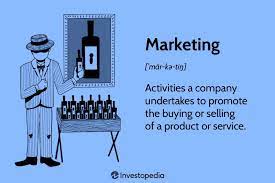The Power of Marketing
Marketing plays a crucial role in the success of any business. It is the process of promoting and selling products or services to customers. Effective marketing strategies can help businesses reach their target audience, increase brand awareness, and drive sales.
One key aspect of marketing is understanding the needs and preferences of customers. By conducting market research, businesses can gather valuable insights that inform their marketing campaigns. This allows them to tailor their products or services to meet customer demands and stand out in a competitive market.
Marketing also involves creating compelling messages that resonate with customers. Whether through advertising, social media, or content marketing, businesses aim to communicate the value of their offerings and persuade customers to make a purchase.
In today’s digital age, online marketing has become increasingly important. Businesses leverage various digital channels such as websites, social media platforms, and email campaigns to reach a wider audience and engage with customers in real-time.
Furthermore, data analytics plays a significant role in modern marketing strategies. By analysing customer behaviour and campaign performance, businesses can measure the effectiveness of their marketing efforts and make data-driven decisions to improve results.
In conclusion, marketing is an essential function for businesses looking to grow and succeed in today’s competitive landscape. By understanding customer needs, crafting compelling messages, utilising digital channels effectively, and leveraging data analytics, businesses can harness the power of marketing to achieve their goals.
Understanding Marketing: Key Questions and Insights for Business Success
- What is marketing and why is it important?
- How can businesses benefit from effective marketing strategies?
- What are the key components of a successful marketing campaign?
- How has digital marketing transformed the way businesses promote their products or services?
- What role does market research play in developing a strong marketing strategy?
What is marketing and why is it important?
Marketing is the strategic process of promoting and selling products or services to consumers. It encompasses various activities such as market research, advertising, branding, and customer engagement. Marketing is crucial for businesses as it helps them reach their target audience, build brand awareness, drive sales, and ultimately achieve their business goals. By understanding customer needs and preferences, businesses can tailor their offerings to meet demand and differentiate themselves from competitors. Effective marketing also enables businesses to communicate the value of their products or services to customers, creating a strong connection and driving loyalty. In essence, marketing is essential for businesses to thrive in a competitive marketplace by effectively reaching and engaging with their target customers.
How can businesses benefit from effective marketing strategies?
Effective marketing strategies can provide numerous benefits to businesses. By implementing targeted and well-planned marketing campaigns, businesses can increase brand awareness, attract new customers, and foster customer loyalty. Through strategic marketing efforts, businesses can differentiate themselves from competitors, showcase their unique value proposition, and build a strong brand identity. Moreover, effective marketing strategies can lead to increased sales and revenue generation, as well as improved customer engagement and retention. Overall, investing in effective marketing strategies can help businesses achieve their goals, expand their reach, and ultimately drive success in today’s competitive market landscape.
What are the key components of a successful marketing campaign?
A successful marketing campaign comprises several key components that work together to achieve its objectives. Firstly, setting clear and measurable goals is essential to guide the campaign’s direction and measure its success. Understanding the target audience and their needs is another critical component, as it allows marketers to tailor their messaging effectively. Creative and engaging content that resonates with the audience is vital for capturing attention and driving engagement. Utilising the right channels, whether it be social media, email marketing, or traditional advertising, is crucial for reaching the target audience effectively. Finally, continuous monitoring and analysis of campaign performance enable marketers to make data-driven adjustments and optimise results throughout the campaign duration. By incorporating these key components into a marketing campaign strategy, businesses can increase their chances of achieving success and meeting their marketing objectives.
How has digital marketing transformed the way businesses promote their products or services?
Digital marketing has revolutionised the way businesses promote their products or services by offering a plethora of innovative tools and strategies to reach and engage with their target audience. Through digital channels such as social media, email campaigns, search engine optimisation, and online advertising, businesses can now connect with customers in real-time, on a global scale. This shift towards digital marketing has enabled businesses to personalise their messaging, track campaign performance in real-time, target specific demographics with precision, and ultimately drive more effective and efficient marketing campaigns. The data-driven nature of digital marketing allows businesses to adapt quickly to changing market trends and customer preferences, leading to increased brand visibility, customer engagement, and ultimately, business growth.
What role does market research play in developing a strong marketing strategy?
Market research plays a pivotal role in developing a robust marketing strategy by providing valuable insights into consumer preferences, behaviours, and market trends. By conducting thorough market research, businesses can better understand their target audience, identify opportunities for growth, and anticipate changes in the competitive landscape. This data-driven approach allows businesses to tailor their marketing strategies to effectively reach and engage with their customers, ultimately leading to more successful campaigns and increased brand loyalty.

